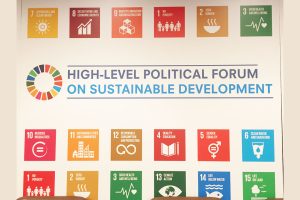16 July 2019: The Office of the Special Representative of the UN Secretary-General on Violence against Children launched a report addressing SDG target 16.2, which calls for ending abuse, exploitation, trafficking and all forms of violence against children. Goal 16 is being reviewed during the UN High-level Political Forum on Sustainable Development (HLPF) taking place from 9-18 July 2019, in New York, US.
The report titled, ‘Keeping the Promise: Ending Violence Against Children,’ was launched on 16 July 2019 during a panel, moderated by Najat Maalla M’jid, Special Representative of the UN Secretary-General on Violence against Children. The launch event took place on the sidelines of the HLPF.
Per the report, at least one billion children experience violence every year. Children also account for 30% of those who are trafficked, and refugee and migrant children often find that violence is a “constant companion,” as it drives them from their home countries, accompanies them on their journey, and waits for them at their destination, the authors write.
On progress, the report indicates that almost 100 countries have comprehensive policies in place to prevent and respond to violence against children, and around 60 countries have comprehensive legislation to ban violence against children in all its forms. Among other initiatives, the report also notes that most of the 20 countries participating in the UN High Commissioner for Refugees’ (UNHCR) Beyond Detention Strategy 2014-2019 have improved their legal and policy frameworks, and the detention of refugee and migrant children is now prohibited by law in Lithuania, Malta, Mexico and the UK.
On challenges, the report cites scarce and fragmented data, including a lack of information on violence against children on the move and the sexual exploitation of boys, and weak child protection systems in many countries.
The report identifies five ingredients for success. For maximum impact, they must be combined, it says. The ingredients are:
- committed political leadership, strong policy frameworks and legislation, backed by predictable resources for implementation and enforcement;
- comprehensive, cross-sectoral approaches, and a preventive and a protective safety net for all children;
- robust evidence and data to address the drivers of violence;
- partnership and alliances to strengthen a “growing movement for children’s freedom from violence”; and
- making the voice of children heard.
The year 2019 marks the 30th anniversary of the adoption of the UN Convention on the Rights of the Child, an international legal framework to protect children’s rights. The Convention is considered as the most widely ratified international human rights treaty. [Publication: Keeping the Promise: Ending Violence Against Children by 2030]

